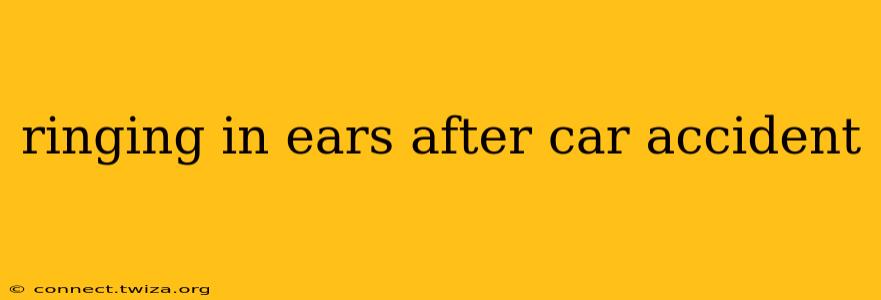A car accident can be a traumatic experience, leaving victims dealing with a range of physical and emotional injuries. While broken bones and whiplash are common concerns, many accident survivors also experience a persistent ringing in their ears, a condition known as tinnitus. This article explores the connection between car accidents and tinnitus, explains potential causes, and guides you through the steps to take if you're experiencing this distressing symptom.
What is Tinnitus?
Tinnitus is the perception of a noise – often described as ringing, buzzing, hissing, clicking, or whistling – when no external sound is present. It can affect one or both ears and vary in intensity and pitch. While it's often associated with hearing loss, tinnitus can occur independently. The severity and type of tinnitus can differ significantly between individuals.
How Can a Car Accident Cause Tinnitus?
The sudden, forceful impact of a car accident can cause a number of injuries that lead to tinnitus. These include:
- Temporary Threshold Shift (TTS): This is a temporary hearing loss often experienced immediately after loud noises, such as the impact of a collision. While usually resolving on its own, TTS can sometimes trigger tinnitus.
- Noise-Induced Hearing Loss (NIHL): The loud sounds of a car crash, including the screech of tires, breaking glass, and the impact itself, can cause damage to the delicate hair cells in the inner ear, leading to NIHL and potentially persistent tinnitus.
- Head Injuries: Concussions and other head injuries frequently result in tinnitus due to damage to the auditory pathways in the brain.
- Temporomandibular Joint (TMJ) Disorder: The force of an impact can dislocate or damage the TMJ, the joint connecting your jaw to your skull. TMJ disorders can sometimes cause tinnitus.
- Acoustic Neuroma: Although less common, a severe car accident could potentially contribute to the growth or development of an acoustic neuroma, a benign tumor on the vestibulocochlear nerve, causing tinnitus.
How Common is Tinnitus After a Car Accident?
While precise statistics are difficult to obtain, numerous studies suggest a significant correlation between car accidents and the onset of tinnitus. The severity of the accident, the type of injuries sustained, and individual susceptibility all play a role in determining the likelihood of developing this condition. Many individuals experience temporary tinnitus following a car accident, which might resolve within days or weeks, while others face chronic, long-term tinnitus.
What are the Symptoms of Tinnitus Related to a Car Accident?
The symptoms can vary widely. Some individuals experience a constant ringing, while others hear intermittent sounds. The sound can be high-pitched or low-pitched, and its loudness can fluctuate. Besides the auditory symptoms, tinnitus can also lead to:
- Difficulty concentrating: The persistent noise can make focusing on tasks challenging.
- Sleep disturbances: The ringing can disrupt sleep patterns, leading to fatigue and irritability.
- Anxiety and depression: The chronic nature of tinnitus can lead to significant emotional distress.
- Headaches: Often accompanies other symptoms, particularly if a head injury is involved.
Can Tinnitus from a Car Accident Be Treated?
While there's no cure for tinnitus, various treatments can help manage the symptoms and improve quality of life. These include:
- Sound therapy: Using white noise or other masking sounds can help reduce the perception of tinnitus.
- Cognitive behavioral therapy (CBT): This therapy helps patients cope with the emotional distress associated with tinnitus.
- Hearing aids: If hearing loss is present, hearing aids can improve hearing and potentially reduce tinnitus perception.
- Medications: Certain medications may be prescribed to address underlying conditions or manage symptoms like anxiety and depression.
What Should I Do if I Have Ringing in My Ears After a Car Accident?
Seek medical attention immediately. A doctor can assess your overall health, diagnose any injuries, and determine the cause of your tinnitus. Early intervention is crucial for managing tinnitus and preventing long-term complications. Your doctor might refer you to an audiologist for a comprehensive hearing evaluation. Reporting tinnitus as part of your injury claim to insurance is also important.
How Long Does Tinnitus Last After a Car Accident?
The duration of tinnitus after a car accident varies significantly. Some people experience temporary tinnitus that resolves within a few days or weeks, while others struggle with chronic tinnitus that may persist for months or years. The severity of the accident and the presence of other injuries influence the duration and severity of the tinnitus.
Can I Claim for Tinnitus After a Car Accident?
Yes, you might be able to claim compensation for tinnitus resulting from a car accident. The success of your claim will depend on proving a causal link between the accident and your tinnitus. Medical evidence from your doctor and audiologist will be essential in supporting your claim. Consult with a personal injury lawyer to explore your legal options.
This information is for general knowledge and informational purposes only, and does not constitute medical advice. Always consult with a qualified healthcare professional for any health concerns or before making any decisions related to your health or treatment.
